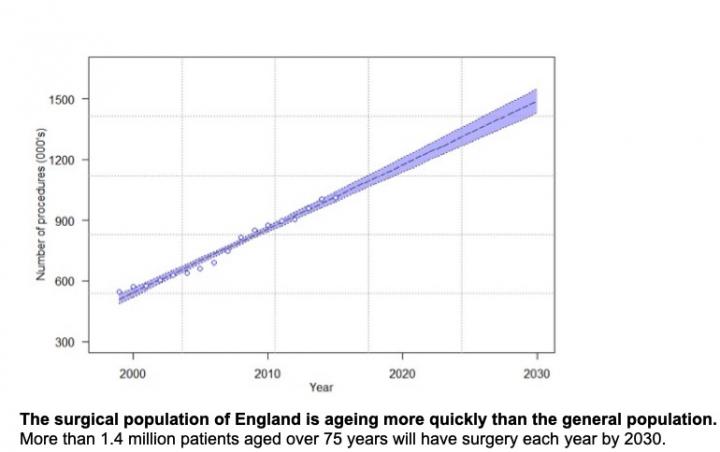
IMAGE: A new British Journal of Surgery analysis reveals that people undergoing surgery in England are getting older at a faster rate than the general population. view more
Credit: British Journal of Surgery
A new BJS (British Journal of Surgery) analysis reveals that people undergoing surgery in England are getting older at a faster rate than the general population.
In the analysis of hospital records in England, the number of people aged 75 years or older undergoing surgery increased from 544,998 in 1999 to 1,012,517 in 2015.The average age of patients undergoing surgery increased from 47.5 years in 1999 to 54.2 years in 2015. By contrast, the average age of the English population increased from 38.3 to 39.7 years.
If current trends persist, by 2030 more than 1.48 million people aged 75 years or older will have a surgical procedure each year. This represents one in ten people in England and one in five people among those aged 75 years or older. Conservative estimates suggest that these operations will cost in excess of €3.2 billion.
Because advancing age is linked with a higher risk of complications and death after surgery, the findings indicate that healthcare policies must adapt to ensure that surgical treatments remain safe and sustainable as the surgical population ages. Also, a public debate about the risks and benefits of some operations for elderly patients may be needed. Finally, there is no reason to think England is a special case, so it is likely these findings are relevant to other European countries.
“Older people are much more likely to experience complications after surgery but this risk is not always obvious to patients and doctors,” said senior author Prof. Rupert M. Pearse, of Queen Mary University of London. “As we offer surgery more often to older patients, we may find the complications outweigh the benefits in many cases.”
###
Disclaimer: AAAS and EurekAlert! are not responsible for the accuracy of news releases posted to EurekAlert! by contributing institutions or for the use of any information through the EurekAlert system.

